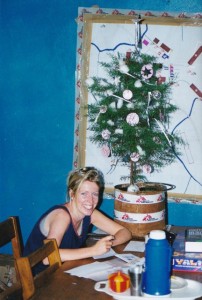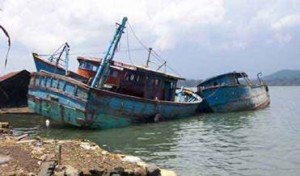Now that the world has not ended on December 22nd, and I am blessed to continue with my comfortable life, the mixed feelings I always have around the Christmas holidays come trouble me again. On the one hand, this time of year is a happy time with a positive vibe, fundraisers and half the world wishing one another peace and prosperity. But at the same time I can’t forget about those many people that have to survive on less than one dollar a day the more than 40 million displaced and the nearly seven million children under five that didn’t make it to their fifth birthday this year. How can one possibly enjoy Christmas and have a Happy New Year with this information?
This year, I’ll be celebrating Christmas and New Year at home. In fact, I have two full weeks of holidays: sleeping late, eating (too) much and do some work around the house. Getting (too) drunk on New Year’s Eve and using the remainder of the holidays to recover. The issue with having two weeks of holidays is that there is also plenty of time to struggle with the above thoughts and think about the past; in my case, some of the most extraordinary places I’ve spent Christmas and New Year.
This started in my first year working for MSF, 1997. Earlier that year, I had spent two missions in DRC and RoC. Kabila had ousted Mobutu, yet thousands had fled Brazzaville to Kinshasa – instead of the other way around… Towards the end of the year I ended up in Bardera, Somalia. Spending Christmas in Bardera is no treat, imagine living there your whole life. And although there were possibly more weapons around in Bardera than in Brazzaville, the intervention in Bardere was not conflict-related. This time it was mother nature: the Juba river had burst its banks, inundating a large part of town, including the– primitive – water treatment plant. While waiting for materials to arrive from Garissa, Kenya, I spent my days helping out WFP which was distributing food, seeds and materials. So it happened that on Christmas Day 1997, I was driving a speedboat on the Juba, distributing relief items. At the end of the day, Christmas dinner was – as any dinner – spaghetti with tomato sauce. The only difference to the every-day Italian staple was having a starter: home-made guacamole with Pringles. Such treat!
 The following year – after cholera in Zambia and floods in China – the year ended for me in Asosa, Ethiopia. Again in the middle of nowhere, again Christmas at 35ºC. Here, in the far west of Ethiopia, MSF provided WASH services in several Sudanese refugee camps. I don’t remember what I had for Christmas dinner; what I do remember is that one of the great pluses of working in Ethiopia is the number of public holidays they have. Both Christmas and New Year is celebrated twice and around the same time Eid was celebrated that year. So, many days off. This wasn’t a punishment as my wife had come over to celebrate the holidays with me. January 1999, we rented a 4WD and travelled around the Omo valley; a great adventure and another great New Year.
The following year – after cholera in Zambia and floods in China – the year ended for me in Asosa, Ethiopia. Again in the middle of nowhere, again Christmas at 35ºC. Here, in the far west of Ethiopia, MSF provided WASH services in several Sudanese refugee camps. I don’t remember what I had for Christmas dinner; what I do remember is that one of the great pluses of working in Ethiopia is the number of public holidays they have. Both Christmas and New Year is celebrated twice and around the same time Eid was celebrated that year. So, many days off. This wasn’t a punishment as my wife had come over to celebrate the holidays with me. January 1999, we rented a 4WD and travelled around the Omo valley; a great adventure and another great New Year.
In ’99 I was home just in time to celebrate a ‘normal’ Christmas and enter the new millennium on the beach in the Algarve. Just before Christmas, I was busy providing relief aid in the state of Orissa, India. Here, millions of people were affected by a super-cyclone that hit the coast. As roads were inaccessible or had never existed in this part of India, we provided public health and WASH services from large barges and smaller – but quicker – dinghies.
Later, as my career progressed, I had the advantage of better planning my field trips around the holidays. This meant that most Christmases were spent at home with the family. That was… until a major Tsunami hits South-East Asia; roughly one month after the birth of my first son. Thus on 27 December 2004 I find myself on a plane to India leaving behind my wife and new-borne.  Travelling straight to the most southern tip of India to assess the damage and provide assistance where needed. As the damage is relatively (!) small here, we travel on to the Andaman and Nicobar Islands after a few days. Here, basically everything is destroyed. Luckily, the whole world is alarmed and responding to the needs in the region.
Travelling straight to the most southern tip of India to assess the damage and provide assistance where needed. As the damage is relatively (!) small here, we travel on to the Andaman and Nicobar Islands after a few days. Here, basically everything is destroyed. Luckily, the whole world is alarmed and responding to the needs in the region.
I clearly remember raising a glass on the New Year in a hotel restaurant in Nagercoil. Surrounded by other aid workers, co-humanitarians that had also sacrificed their holidays and had hurried to the scene. And although I cannot remember their names or faces anymore, I felt privileged and great!
So, for me, the holiday season is a time to remember the terrible, but at the same time great times I have had far from home. A feeling of nostalgia to the days that I was able to help in making the world a little bit better. As little as it may have been, for me it was exhilarating. So, instead of letting reality drain away all hope of a better, just and fair world, it just gives me more reason to stick to my good intentions for 2013 (and the remainder of 2012): to enjoy and appreciate my fortune (i.e. my lovely wife and two great boys) and continue pulling my weight into making this world a better place – as petite as this weight may be.
Happy 2013!